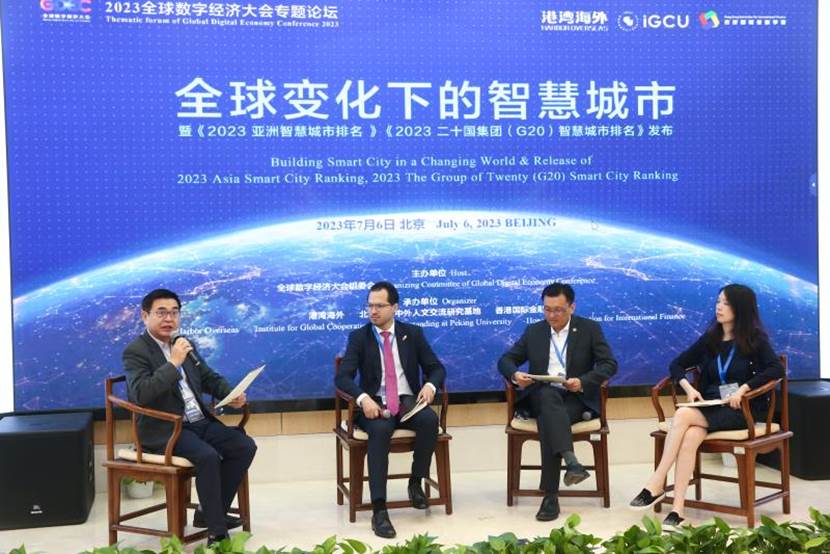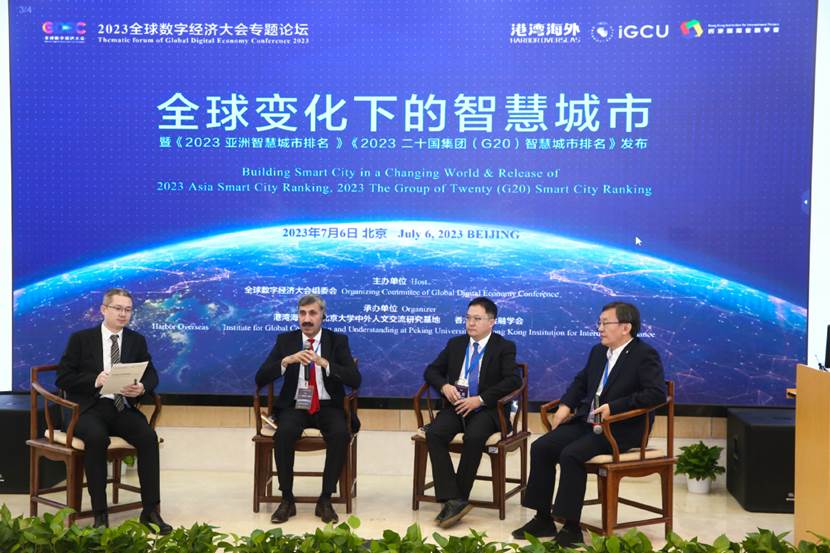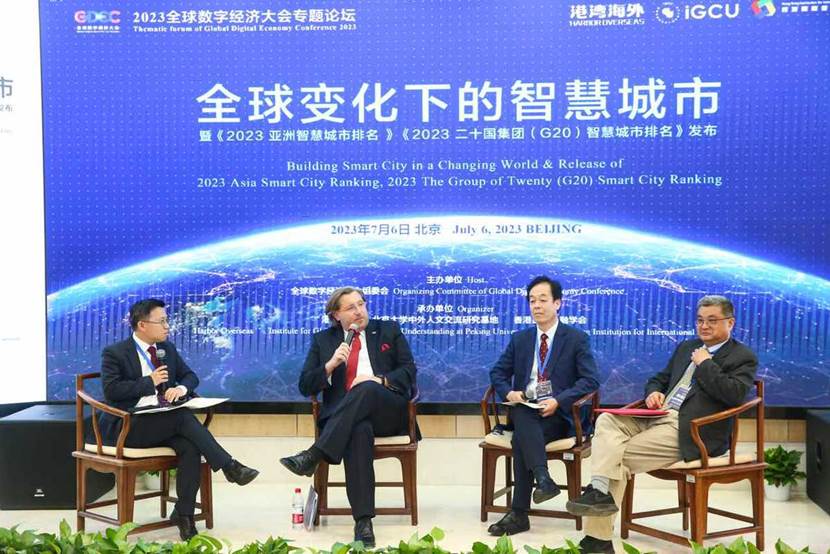
Professor Geng Xiao, Chairman of the Hong Kong Institution for International Finance, presided over the panel discussion of "International Finance, Global Governance, and Regional Integration" on a forum held on July 6 at Peking University. [Photo provided to China Daily]
The "Building Smart Cities in a Changing World" forum took place on July 6 at Peking University, as a part of the four-day 2023 Global Digital Economy Conference, which began on July 4.
Co-organized by the Harbor Overseas, the Institute for Global Cooperation and Understanding (iGCU) at Peking University and the Hong Kong Institution for International Finance, the event released two reports on "2023 Asia Smart City Ranking" and "2023 The Group of Twenty (G20) Smart City Ranking".
During the event, Professor Jiang Shigong, director of Social Sciences Department at Peking University; Peng Xuehai, deputy director of the Beijing Municipal Bureau of Economy and Information Technology; and Professor Tang Shiqi, dean of the School of International Studies at Peking University, made the remarks. Former Prime Minister of Kyrgyzstan Djoomart Otorbaev, former Foreign Minister of Egypt Nabil Fahmy, Vice President of Asian Infrastructure Investment Bank Danny Alexander and Deputy Director of Peking University Council Professor Yu Hongjun delivered keynote speeches online and offline respectively.
Over a period of six months, the reports evaluated a total of 243 cities worldwide, including 144 from Asia and 184 members of G20. The evaluation involved the participants of 32 global policymakers and top experts. Furthermore, the report conducted rigorous verification on tens of thousands of data sources in 21 languages.
In the ranking of individual cities within the G20 countries, Chinese cities such as Beijing, Shanghai, Shenzhen and Chongqing, as well as international cities such as London, Berlin, New York, Helsinki, Hamburg, Copenhagen, Stockholm, Moscow, San Francisco, Munich, Paris, Lyons, Milan and Washington are among the top 10 per cent.
In terms of individual cities in Asia, Chinese cities such as Beijing, Shanghai, Shenzhen, Chongqing and Hong Kong, as well as Asian cities like Singapore, Tokyo, Seoul and Yokohama, are also among the top 10 per cent.

Dr. Xi Chen, the founder of Harbor Overseas, presided over the panel discussion of "Smart City and Regional Integration" on a forum held on July 6 at Peking University. [Photo provided to China Daily]
Dr Xi Chen, the author of Asia Smart City Ranking and The Group of Twenty (G20) Smart City Ranking, said with the reconfiguration of super globalization in new forms, economies from the Mediterranean to the Pacific are actively seeking economic regionalization. Additionally, international organizations associated with China, such as the BRICS, the Asian Infrastructure Investment Bank (AIIB) and the Shanghai Cooperation Organization (SCO) are also expanding.
Considering these trends, the 2023 Asia Smart City Ranking and 2023 The Group of Twenty (G20) Smart City Ranking are released at an opportune moment, he stressed.
Following the release of the reports, scholars and experts conducted panel discussions on various topics including "Smart City and Regional Integration", "International Relations and Regional Integration", and "International Finance, Global Governance and Regional Integration". During these discussions, all participating agreed that rapid urban development plays a crucial role in the modernization process and serves as a significant force driving globalization. Building smart cities will promote innovation, reform and openness, providing new development momentum for social progress, and enhancing the ability and resilience of cities to adapt to global changes.
Croatian ambassador to China Dario Mihelin; Deputy Chief of Mission and Minister of the Embassy of Malaysia in China Sanmugan Subramaniam; diplomats from Turkey, Pakistan, Mexico, Turkey, Ireland and the Delegation of the European Union to China; leaders or chief engineers of state-owned enterprises; experts from renowned institutions like Peking University, Tsinghua University, Beijing Normal University, Chinese University of Hong Kong (Shenzhen), Columbia University. Representatives from Beijing Municipal Bureau of Economy and Information Technology, Beijing Municipal Commission of Development and Reform, Beijing Municipal Forestry and Parks Bureau, the Export-Import Bank of China and the China-Africa Development Fund also participated in the event.

Professor Dong Wang, Executive Director of the Institute for Global Cooperation and Understanding (iGCU) at Peking University, presided over the panel discussion of "International Relations and Regional Integration" on a forum held on July 6 at Peking University. [Photo provided to China Daily]
